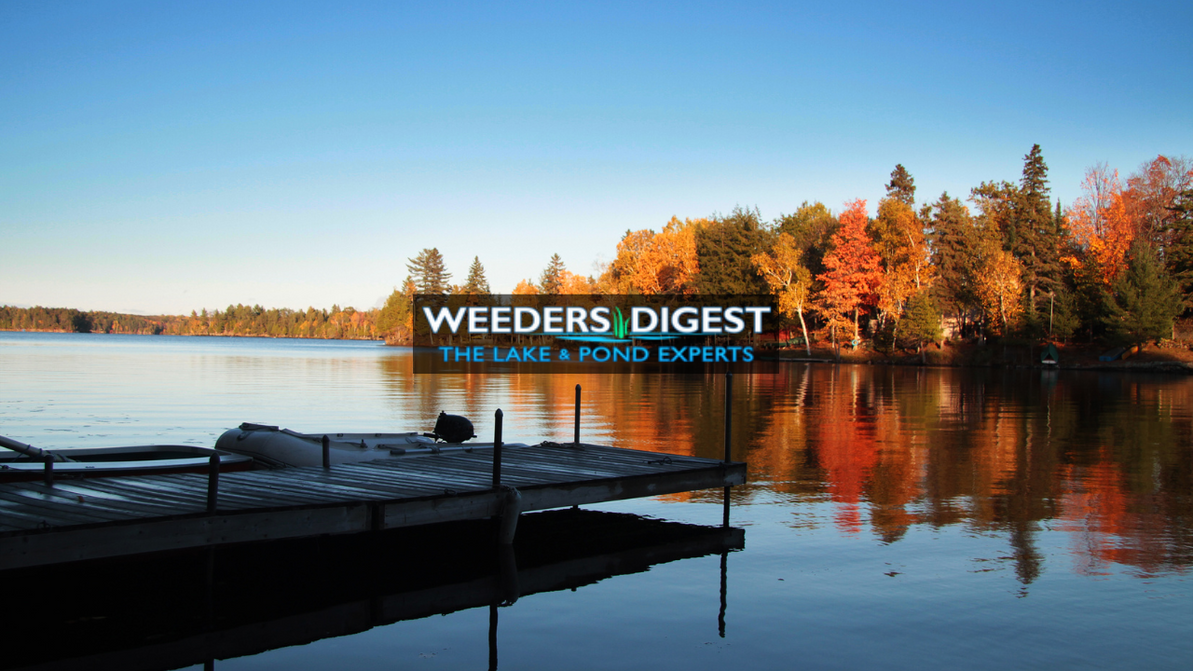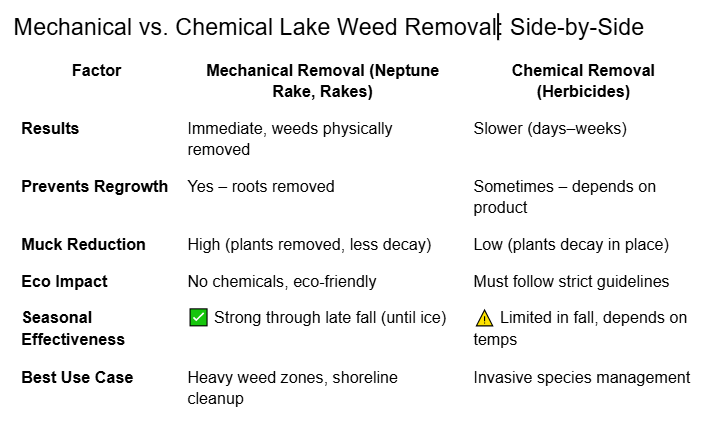Mechanical vs. Chemical Lake Weed Removal in Fall
When fall arrives, pond and lake weeds don’t just disappear; they start dying back and sinking to the lake bottom, where they decay into muck. If left untreated, that organic matter becomes the foundation for algae blooms and thicker weed growth the following year. The key to a healthier pond in the spring is deciding how to manage weeds now: mechanically or chemically.
Why Lake Weed Control Still Matters in Fall
While fall may not have the explosive growth of summer, treating dying lake and pond weeds is just as critical. Each decaying plant adds to the muck layer and releases nutrients that will later feed algae and invasive species once the water warms. By removing or treating these weeds before your lake freezes over, you can break this cycle and give beneficial bacteria a chance to work more effectively.
Mechanical Lake Weed Removal
Mechanical weed removal uses powered equipment to cut or extract aquatic plants directly from the water. By removing weeds instead of letting them sink and decay, you prevent new muck from forming and reduce the chances of regrowth the following season.
Top Mechanical Options:
- Neptune Rake – The most powerful mechanical option, capable of dredging both weeds and muck. It can be deployed from shore by two people and pulls in up to 2,000 lbs of lake and pond weeds and muck per pass with winch assistance. Perfect for larger shorelines or lake associations looking for heavy-duty cleanup.
- Aquatic Mower – A boat-mounted underwater cutter that quickly mows through aquatic vegetation. It cuts tougher weeds and clears wide swaths efficiently. Great for large areas where you need more reach and quicker work.
Mechanical lake and pond weed removal gives you direct control, immediate results, and substantially reduces the amount of decaying organic matter entering the muck layer.
Chemical Lake Weed Removal
Chemical methods use herbicides to kill weeds in place. In some regions, eco-friendly herbicides are permitted for late-season use. These products suppress growth, but their effectiveness can depend on several factors.
Key Considerations for Fall Use:
- Water Temperature: Herbicides are most effective when water temperatures are high enough for the plants to absorb the chemicals.
- Muck Formation: Treated plants still decay and contribute to muck if they are not physically removed.
- Local Regulations: Always check state or local restrictions before applying herbicides in the fall, as timing may limit what's allowed.
While chemical treatments can effectively control stubborn invasive species, they are often less ideal in the fall because the plant matter remains to decay, adding to your muck problem.
Lake & Pond Weed Removal Q&A
Q: Is fall too late for weed removal?
No, fall is one of the best times. Removing weeds before they decay prevents muck and nutrient buildup over winter.
Q: Which is better in fall, mechanical or chemical removal of lake weeds?
Mechanical removal is more effective late in the season because it physically removes biomass. Herbicides may have limited impact as water cools.
Q: Can I combine both methods?
Yes. Herbicides can control invasive species in regulated areas, while mechanical tools clear the biomass. This hybrid approach is common in large lakes.
The Bottom Line for Fall Lake Weed Removal
Ultimately, fall weed control isn't about halting growth, it's about proactively preventing next year's problems. Mechanical tools, like the Neptune Rake, offer immediate results by physically removing biomass before it has a chance to decay into muck. While herbicides can be a targeted solution for stubborn invasive species, their effectiveness wanes as water temperatures drop.
Making the right choice for fall lake weed control can be complex, but you don't have to tackle it alone. When it comes to managing lake weeds, the pros at Weeders Digest have the tools, expertise, and guidance you need. With decades of experience on the water, we can help you create a custom plan to get ahead of your lake or pond weed problems and ensure a healthier, cleaner lake next spring.
Recent Posts
-
Natives vs. Invasive Aquatic Weeds | What’s the difference between Native Plants and Invasive Plants in my Lake
Natives vs. Invasive Aquatic Weeds | What’s the difference between Native Plants and Invasive Plants …6th Feb 2026 -
The "Spring Clear-Water Phase": Why Your Pristine Lake Turns Cloudy Every Summer
The "Spring Clear-Water Phase": Why Your Pristine Lake Turns Cloudy Every Summer Summary:Many lake o …6th Feb 2026 -
Creating a Thriving Ecosystem: Attracting Wildlife to Your Lake Property
The Vision of a Living Shoreline Lakefront living offers a unique opportunity to connect with nature …4th Feb 2026






